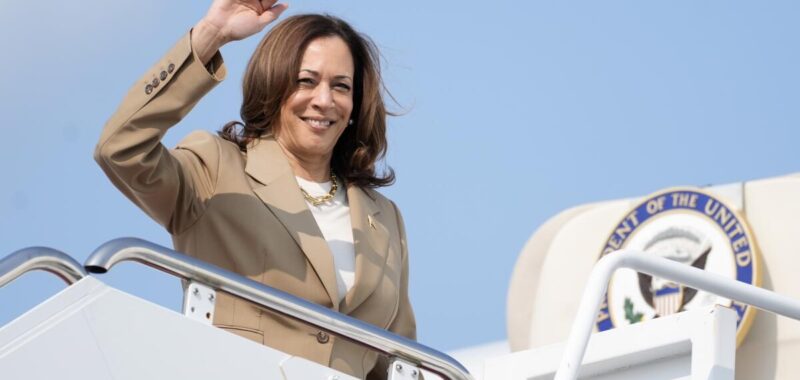Will it be Kentucky Gov. Andy Beshear or Arizona‘s U.S. Sen.Mark Kelly? Another woman, or a white man? An experienced politician, or an exciting newcomer?
Ever since President Biden announced he wasn’t seeking reelection and endorsed Vice President Kamala Harris as his replacement, the betting game over whom Harris will pick as her running mate has seen more action than NFL Opening Day.
The names of hopefuls bandied around by pundits and Democratic voters alike have spanned the country, age groups, and the gradations of the liberal spectrum. But in nearly all the conversations I’ve seen, heard and read, there’s an unsurprising omission:
Latinos.
In an election year where Latino voters can make or break the presidential hopes of Harris and Donald Trump in swing states such as Arizona, Michigan and Pennsylvania, there has been little serious talk about Harris choosing someone from the largest minority group in the country.
No major media outlet included a Latino in their list of potential Harris picks — not this paper, not the New York Times, not Politico, CNN, NPR or any of the major networks. Washington Post columnists, meanwhile, offered up Dwayne “The Rock” Johnson, even though the actor-jabroni announced earlier this year he wouldn’t be endorsing anyone.
This widespread omission is offensive — but not for the omission itself.
I get that the winning calculus for Democrats right now must lean on cold, hard realpolitik if they want to stop Donald Trump from retaking the White House. Harris will probably go with a white veep to stave off any fears of undecided voters who might already be uncomfortable with the idea of a half-Asian, half-Jamaican woman leading this land. She’ll probably choose a man to calm down all the bros out there. And in a year where immigration is a huge issue for Republican voters and big even for Democrats, a Latino veep might raise political complications — as odious and unfair as they may be.
No, what’s most offensive about the lack of Latinos to run alongside Harris is that it’s an uncomfortable reminder about the reality of their political power nationwide.
With the exception of New York Rep. Alexandria Ocasio-Cortez, no current Latino elected official has much of a national profile. And one of them kind of does — but for the wrong reason: The senior Latino U.S. senator, Robert Menendez of New Jersey, is going to resign in August because he was recently convicted on bribery charges. The highest-ranking Latino in Congress, Rep. Pete Aguilar, brings all the buzz to his position of someone who was the former mayor of tranquil, overlooked Redlands.
We’re far removed from the days when people such as former San Antonio mayor Henry Cisneros or Antonio Villaraigosa made people plausibly dream about a Latino on a presidential ticket. We’re in zero-ville today even though the number of Latinos in elected office has more than doubled since 2000, according to the National Association of Latino Elected and Appointed Officials, and 2022 saw more Latinos elected to Congress than ever before.
All these politicians are veritable minor lords, at best, in the Democratic Party kingdom — and any opportunity to climb up the hierarchy seem further away than ever.
Democrats have relied on the Latino vote for presidential elections going back to the JFK era, yet the current paucity of Latinos that could conceivably join Harris is an indictment of a party that seems to have never planned for the possibility that Latinos might seek an office higher than Congress. Compare that with the GOP’s far better record. The first-ever Latino to seek the presidential nomination of a major political party, Ben Fernandez, ran for the Republican nomination in 1980. In 2016, U.S. Senators Ted Cruz and Marco Rubio were among the last candidates to withdraw from the Republican presidential primaries before each endorsed Trump. Rubio was on the long list to be Trump’s wingman in this election, because he’s a household name, can articulate Trumpism fluently in Spanish and represents Florida, a swing state.
Meanwhile, the only two Latinos to have ever launched nationwide campaigns for the Democratic presidential nomination, former New Mexico Gov. Bill Richardson in 2008 and former U.S Secretary of Housing and Urban Development Julián Castro in 2020, earned next-to-no support and saw their hopes wither by the New Hampshire primaries.
You won’t hear any public teeth gnashing from Democratic Latino leaders about how we’re on the outside looking into Harris’ VP sweepstakes, even though they rightfully lambasted her in 2021 when she went to Guatemala and told the region’s residents: “Do not come” to the United States. They get that rallying around her right now is important, especially after Trump made big inroads among Latinos in his failed 2020 reelection campaign despite being the most xenophobic president ever.
Yet 2024 will be the latest election where Democratic Party leaders will ask Latinos to side with them, with the promise that our day for a chance at the top will come. But who knows? To paraphrase Vin Scully, in an improbable political year where the impossible regularly happens, maybe Harris will buck conventional wisdom and pick a Latino or Latina.
Beats me who that could be.

